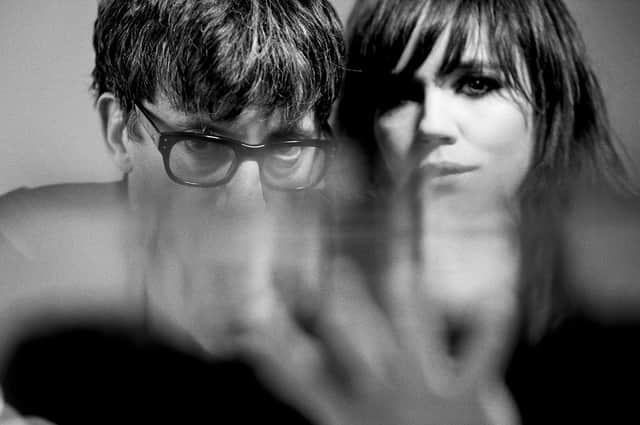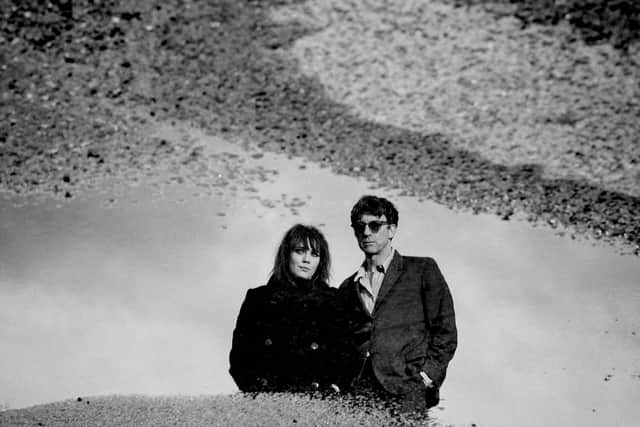The Waeve: 'We gave each other the permission to just fly'


This month they released their first album together under the band name The Waeve.
“We hadn’t really seen each other an awful lot, maybe a couple of times at some aftershow party or awards thing,” says Coxon, the Blur guitarist and maker of a dozen solo albums, on why it was not until December 2020 that he and Dougall discussed the possibility of a songwriting collaboration. “But we met at The Jazz Cafe, we were both doing short sets for a charity event there. All of the bands were stuffed into one dressing room, so we were all hanging out and having a laugh and a joke, but later on Rose and I had a conversation outside where the idea was broached that we could maybe write a song one day.
Advertisement
Hide AdAdvertisement
Hide Ad“That stuff is said quite often, but I kind of thought that would be a good idea, so I got her number at the end of the night and we corresponded over that Christmas, sending each other links to songs we liked etcetera, learning about each other’s music tastes – she has fantastic taste in music, obviously – and then decided that we would meet. I think it was January 2 and we had a long walk around Hampstead Heath, very unglamorous in wellies and overcoats, with a particularly blinding sun, then before we knew it we were in the room here starting work on some stuff.”
Very quickly they settled into working in two or three sessions a week. “Even after a couple of weeks we found that songs were really beginning to take shape and we were getting things that we were genuinely excited about and seemed to be working well.”
“We didn’t expect it to become this huge thing like it has,” says Dougall. “But it became obvious very quickly that it was a very rich, creative seam to follow. It felt like we didn’t really have a choice but to explore it, it would have been a waste not to.”
The pair discovered a lot of common ground in their discussions about music. “I could not surprise her with anything, really. She kind of knew everything I knew, apart from a couple of what might be considered old farty stuff,” says Coxon, referring to his fondness for prog rock.
Advertisement
Hide AdAdvertisement
Hide Ad“It covers a lot of ground, that stuff. Whether it’s Gong, Robert Wyatt, Matching Mole, Van Der Graaf Generator, Caravan, Kevin Ayers, it’s all over the place. She knew about Kevin Ayers but sonically there’s things in King Crimson that she may not have explored a lot and Van Der Graaf Generator. If it wasn’t for King Crimson or Van Der Graaf Generator there may not have been saxophone on the album or certain attitudes towards organ sounds. It all informed the music that we were creating. We were having an awful ot of fun with the sonics and using whatever instruments were lying around, and also a vast library of synths on a computer, and string sounds. It’s all there to explore very quickly, so you can try a lot out.”


“I think we ended up honing a sound to avoid getting too sucked into that world, using the tangible things that we could actually play in our hands,” adds Dougall. “You can get really lost in that world and end up chucking the kitchen sink at something and lose sight if there’s anything good beneath all this stuff.”
Ultimately it came down to chord sequences, says Coxon, as in “the difference between my chord sequences and then when Rose would take over with a lot more harmonically richer chord sequences, maybe on piano; what would happen with melody; how Rose would harmonise with herself; what notes she would find in that chord progression and what melody I would find in that chord progression. It might be different so that would form a different section, and then we might think ‘strings here’ and think about dynamics, and before we knew it the song might be ten minutes long and we’d have to rein it in a bit.
“Quite often it was like a rabbit warren, it just kept going and going with these songs. Some went on forever and are still probably going somewhere, but the ones that we could keep control on ended up on the record.”
Advertisement
Hide AdAdvertisement
Hide AdCoxon and Dougall have talked about pushing themselves out of their respective comfort zones with this record. Today, Dougall reflects: “It’s a funny old business when you’re initiating energy to write when you’re on your own. Sometimes it feels like you’re pouring energy into a black hole. Working with other people is actually sometimes the best way to see it. You know that (Velvet Underground) song I’ll Be Your Mirror? It actually reveals yourself to yourself in a way. What is difficult is finding the people that are actually able to do that. Sometimes with all the best intentions in the world, these things don’t work.
“What’s really wonderful and magical about music to me is that it does exist; the stars just have to align for it to really work. But it doesn’t happen all the time. I think that is what happened this time, and it’s a real gift. For me, I found this process just as, if not more, satisfying than making records alone. We afforded each other the freedom to express ourselves in our most natural state, but also to have fun and not be too uptight, and encouraged each other to do things we might not (otherwise) have had the guts to do.
“I think it’s really great if you’ve got someone else going ‘Go on, do it’, it really helps.”
“It’s interesting about comfort zones,” Coxon says. “Who wants to be in a comfort zone? It’s kind of a boredom zone and frustration zone, and I’m so fed up with myself. It was so great to have the support of someone when you’re unsure of your own capabilities. I might be fiddling about with this section on the guitar and I might be reticent and Rose goes, ‘Just do Graham Coxon, do your thing’ and great, you can do it.
Advertisement
Hide AdAdvertisement
Hide Ad“There was a bit where I wanted Rose to shout more, to push her voice, and we gave each other the permission to just fly, to take off, to not be stuck within ourselves. I think that was the big thing for me, because there’s nothing worse than musically being stuck within your own habits. That’s a comfort zone, but it isn’t comfortable, it’s really tedious and depressing.”
“There’s nothing to really find out there,” says Dougall.
One of the album’s themes is an exploration of Englishness. Dougall admits to feeling discomfort with the concept in the years leading up to the Brexit referendum and ever since. “Neither of us can escape our cultural identities, and they’re not easy ones to wear with pride, so what are you going to do about that? I think we’re identifiably English-sounding, both of us, we both sing in our own natural accents, and that’s always been quite important to me. I guess that tension and conflict is objectively interesting to explore, but it’s important to think about it and dwell on it.
“What are the things you can hold on to when everything else feels like it’s been co-opted by evil. There are beautiful cultural things to still be really excited about, and beautiful landscapes to be inspired by, the weather is amazing. There’s great energy in this country still to fuel more things culturally.”
“It’s weird because whatever political persuasion you are, you love this country,” says Coxon. “I suppose if you’re left of centre you’re not supposed to particularly love this country or have the same sort of pride, but it’s a whole different angle on it.
Advertisement
Hide AdAdvertisement
Hide Ad“I liken it to the thing of looking through a hag stone – a stone that has a hole in it – and the world of the fair you see through that, and I think the magical side of England, its coasts and its woodland and its mountains, its heritage that a lot of people are ashamed of, is actually extremely rich – like the folk songs and the stories and our history. It’s a very interesting, magical island. It’s full of contradictions but I think we tended to go within the world of folklore and explore that and use that for some storytelling and to carry some of the feelings and emotions in the songs.”
Coxon might be reuniting with his Blur bandmates Damon Albarn, Alex James and Dave Rowntree for a world tour in June, July and August, but he and Dougall are both keen for theri collaboration to continue. “The Waeve machine is fully topped up with batteries and it’s just going to keep ploughing through the year and ever onwards, really, whatever happens,” the guitarist says. “We have a need to carry on our work and those needs will turn into plans.
“We have a tour in March and we’re going to be stepping out and doing a few festivals in Europe then that will take us through to the autumn and we’ll see what happens then, but it’s definitely an ongoing concern.
“The same as Rose, really, it’s an area where I don’t have to be self-sufficient. You’d think self-sufficiency would be freedom but it’s not if you’re stuck in a frustrating comfort zone that you need to be kicked out of. I feel my most free with Rose musically, so that’s the most exciting thing about it.”
The Waeve’s self-titled album is out now. They play at Brudenell Social Club, Leeds on March 23 and Sheffield Foundry on March 24.
